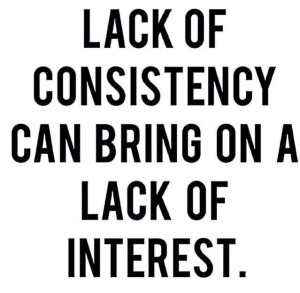 At Leadership Vision we teach, coach, and ‘bring forth’ a number of thoughts and actions in the course of working with individuals and teams who want to become more effective leaders. One area that seems underserved is the discussion and reflection about ‘consistency.’ Consistency for me is how we ‘show up’ every day in who we are and the roles we play. Is it ‘consistently’ positive, or negative? It seems to me that the consistency with which we ‘show up’ can have a profound effect on the lives we live, the experiences we have, and the success we enjoy.
At Leadership Vision we teach, coach, and ‘bring forth’ a number of thoughts and actions in the course of working with individuals and teams who want to become more effective leaders. One area that seems underserved is the discussion and reflection about ‘consistency.’ Consistency for me is how we ‘show up’ every day in who we are and the roles we play. Is it ‘consistently’ positive, or negative? It seems to me that the consistency with which we ‘show up’ can have a profound effect on the lives we live, the experiences we have, and the success we enjoy.
Consistency ‘shows up’ in a variety of ways. I believe it shows up first in our behavior. Do you tend to ‘react’ to situations/people, or do you ‘respond?’ ‘Reacting’ means that you feel an emotion and immediately react to that emotion. How often have you done or said something in the ‘heat of the moment’ and regretted it? I suspect almost everyone has had one or more of those moments. We learn in that moment that our words have not only the power to encourage and heal, but they can have an equal amount of power to do harm – to a situation or to a relationship.
In organizations one of the by-products of reacting to others is that the focus of those experiencing this ‘reaction’ is often on the reaction and not on the work/problem at hand. In the moment our ‘reaction’ often has the opposite effect from what we want. This is evident when we view those people hours later still ‘discussing’ the earlier events. We lose productivity and momentum. If you are a senior leader remind yourself that your emotions are often far less important than those of the people who are responsible for the situation. Focus on the outcome you want from others when emotions are involved.
If our tendency to ‘react’ also applies to the decisions we make, the decisions are often not fully thought out and the process may not include all the people necessary. This leads to inconsistency in the decision making process and often leads to the need to correct parts or all of the decision later. People and organizations that experience this type of decision-making often syphon off positive energy because inconsistency leads to a lack of interest.
Our world is full of change, and the rate of change continues to accelerate. As stress increases with this pace of change, and the need to make good decisions faster, it is easy to understand the increased temptation to ‘react’ rather than respond. Even our brain can work against us. We know that our Amygdala is the emotional center, and we have an emotional response first to all situations/people. It takes intention to move from our Amygdala to our Prefrontal Cortex, our thought center.
I have found that the best way to deal with this is to create a ‘pause’ button between the stimulus (event) and my response. Sometimes it is simply taking a deep breath. Other times it involves asking more questions about the situation in order to better understand and to give my emotions time to ‘wind down.’ In other scenarios there is a need to ‘step away’ for a period of time. “Right now I need a little time. Let’s take this up again tomorrow.” Whatever the ‘pause button’ looks like, it takes discipline and focus to create the space we need to be ‘response-able.’ Our ability to respond forms the basis of what our consistency looks like for our children, the people we love, our co-workers, and others we work and come in contact with. Who do you choose to become when it comes to consistency?
One final thought, perhaps there has never been a time when responses need to be more response – able. While we may not talk about it much as leaders, consistency builds a strong leadership foundation that lends itself to more predictability and greater trust. If we want others to have confidence in us and our leadership, showing up consistently is a strong component. Where in your life are your greatest opportunities to show up more consistently?
